BBC Sport on the preparations for Euro 2020 with a new look VR studio and a logistical headache
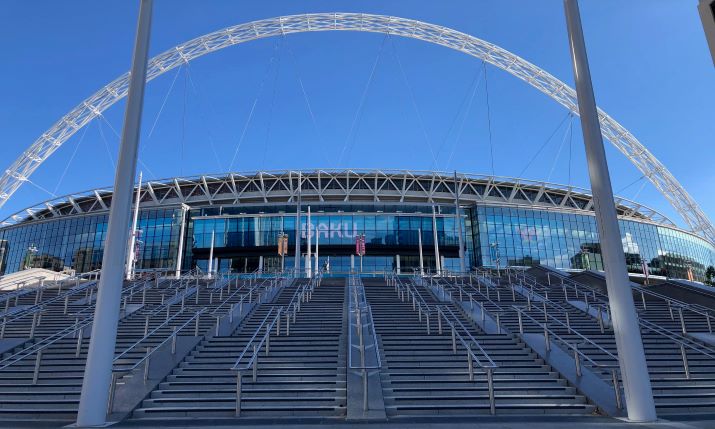
Wembley Stadium being prepped for Euro 2020 by BBC Sport’s Phil Bigwood, executive producer football
UEFA Euro 2020 is finally upon BBC Sport, one year late, and despite the action kicking off in just a few hours, many parts of the production are still a moveable feast thanks to ever-changing COVID restrictions. The broadcaster, however, is ready and is even launching a new look for all of its football programming at Euro 2020 with a new 360-degree virtual reality (VR) studio set.
On how the run up to Euro 2020 has gone so far for the British incumbent, executive producer football at BBC Sport, Phil Bigwood, tell SVG Europe: “I think it’s probably fair to say this is the most difficult and challenging event I’ve overseen.
“I’ve looked after the major football tournaments [at BBC Sport] for nearly 20 years now and done every one over that time, so I think my colleagues and I know a lot about broadcasts, but I’ve never had one quite like this, for all the obvious reasons with COVID.
“There’s a lot that really going to the wire, last minute; even this week we’re getting announcements around what we can do in and around stadiums and what the travel plans are. So the logistical planning side of it has been a huge challenge and it continues to be a challenge, but we’re getting there.”
Bigwood adds: “Whether it be UEFA or any of our partners, I think we all recognise it’s quite a difficult [event compared to before 2020], so everybody’s working together to try and deliver it in the best way we can.”
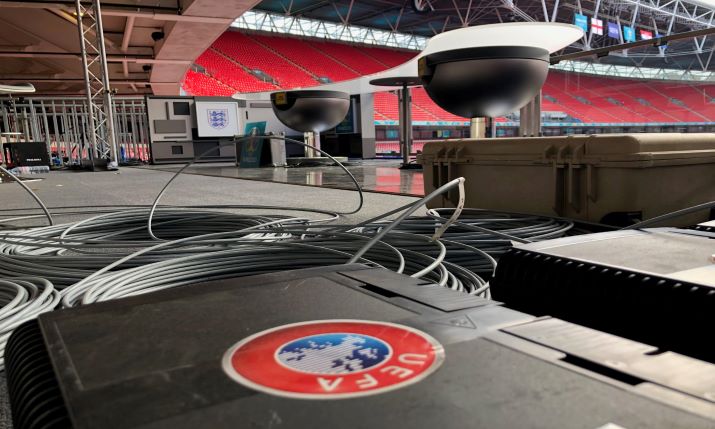
BBC Sport is launching a new look for all its football programmes with a 360 degree VR studio set at Euro 2020
Strong start for the home nations
England, Scotland and Wales’ opening games are exclusively live on BBC Sport. The opening game, Turkey v Italy, in Rome on Friday 11 June is the first of 25 live matches across BBC One, BBC Two, BBC iPlayer and the BBC Sport website and app.
That is followed by Wales v Switzerland on 12 June, England v Croatia on 13 June and Scotland v Czech Republic and Spain v Sweden on 14 June, giving BBC Sport audiences the first opportunity to see all the home nations who qualified in action.
“We’ve built a 360 degree virtual reality (VR) studio. We’ve got a new set and a whole new set up. So whether we’re on the road or whether we’re in Salford, the aspiration is that everything will have a similar look and feel and branding.”
Working with ITV Sport, the BBC will also have first and second pick of the games at the last 16 and quarter-final stages. “So we start really strong with all the three home nations,” says Bigwood. “But what comes with that is all the planning. The [current] plan is to present onsite for the England game and for the Scotland game. Obviously because Wales are in Bakku, that’s a whole different challenge. What we’ve decided to do is send a commentary team out to Bakku, and that is our one commentary team that’s traveling. Everything else will be done back in Salford or onsite in Glasgow and Wembley.”
All the core BBC Sport editorial and production team will be based in Salford, utilising the studio there at dock10. Yet even though BBC Sport is sending a minimum of crew around and outside the UK, it is still not easy. Bigwood says that with BBC Sport’s IBC for Euro 2020 in Haarlem, just outside of Amsterdam, a crew from BBC Sport left the UK two weeks ago to go through quarantine measures to get to the broadcast hub for the build up to the start of Euro 2020. However, it had been touch and go as to whether the team would even be allowed into the country.
Bigwood comments: “A few weeks ago with everything that’s going on in the UK at the moment with COVID, and because of the respective rules around the different countries, we weren’t sure whether staff would even be allowed into the Netherlands. But as of [Tuesday 8 June] we had the signal up from there into the BBC base in Salford. So that key component of our operation is looking good.”
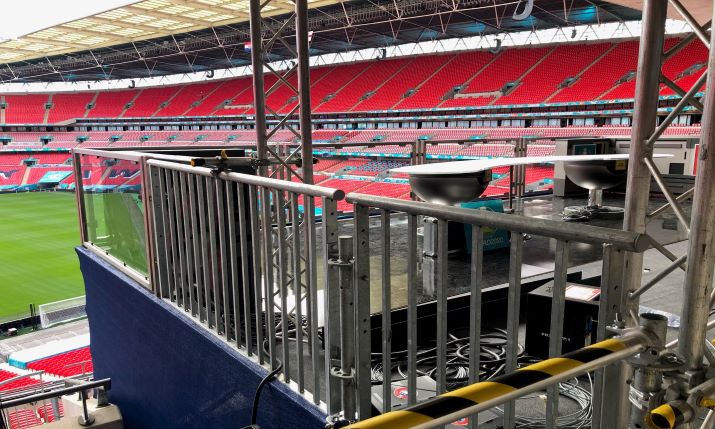
Preparing for Euro 2020 has been a complicated task for BBC Sport, but Phil Bigwood says, “we’re getting there”
Location, location, location
On BBC Sport’s crews moving from location to location, plans have been made, changed, and are still hanging in the balance, says Bigwood. “The other things that got considered were that any people we do send overseas have then got to do all of the restrictions and quarantining on the way back. Now some countries like Germany have effectively banned all UK citizens going into the country, so for the likes of the games in Munich we’ve got to approach [those matches] differently. And all of that is happening very late in the day. So whether it’s flights or hotels, you know, we would typically have that sort of thing in place many, many months before.
“Only last week we were able to confirm certain facilities. I know UEFA has the same issues. So we’re all facing similar challenges”
“Our OB supplier for this event is Timeline TV, so way back – two years ago now – we did have aspirations to present a lot more on site at some of the bigger games, but obviously we’ve had to change that,” he continues. “So it’s just the uncertainty of where we can put the facilities, as you’d appreciate with a tournament of this size; the number of freelancers and people we work with and trying to do the right thing by everybody, and at the same time, not really having definite confirmation of what we can do and where we can send people.
“That’s been the biggest challenge,” continues Bigwood. “Only last week we were able to confirm certain facilities. I know UEFA has the same issues; they’ve now got 11 match production teams in each of the venues, whereas before they were going to pair up [with one match production team working between two venues]. So we’re all facing similar challenges.”
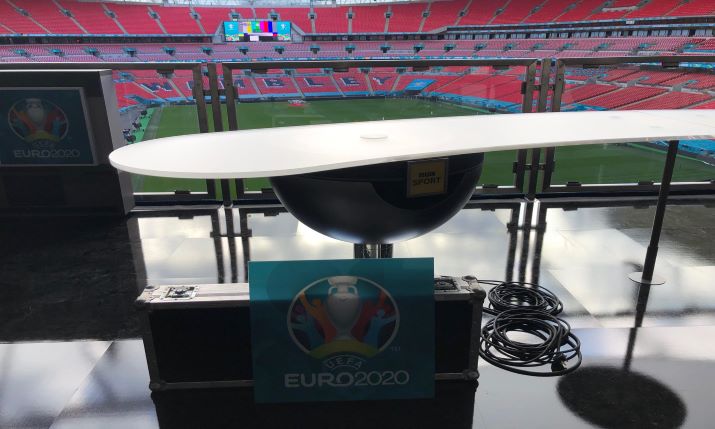
The BBC Sport commentary set up at Wembley Stadium in London this week
Complicated unknown logistics
Bigwood is rotating around all the UK venues and Salford. “Obviously it’s a big question for the whole country, but depending what happens on 21 June and whether things change or are delayed or opened up, we’ve still got an aspiration to present far more games on site if we can, as the tournament builds to its conclusion. But obviously we just don’t know that yet.
“The joy of knockout football, of course, is England could play their last group game. If they win the group, they play at Wembley. And if they come second in the group, they would go to Copenhagen. So that’s an extremely different options if we face that. Also, if they finish second in the group, the way that the split with ITV works is the BBC has got first two picks in the last 16 and the first two picks in the quarter finals. So therefore whichever home nations progress, we could, we could do two of them. And obviously we’re hopefully two home nations progress for the quarter finals as then we would get both of those games, but… if England wins and go to Copenhagen, and if they were to win that game, the quarter final would then be in St Petersburg three or four days after. So there’s lots of that sort of thinking going on at the moment.”
He continues: “Ideally, a game of that magnitude, you can imagine it’s going to be watched by the whole country. You’d like to be able to do what we’ve done previously to now [by going on location], yet we have to be realistic and we have to be pragmatic that getting into somewhere like Russia with only a few day’s notice is going to be extremely challenging. I think we’d go from more of a hybrid approach there. We’re just trying to have facilities in place where we can so that we can react as the results pan out.”
Other broadcasters are, of course, facing the same logistical issues as BBC Sport. Bigwood says there are a lot of conversations going on: “I’ve been reaching out to various broadcasters to say, “could you maybe help us out with this?” And likewise with the event culminating at Wembley and because of the COVID situation, and potentially certain people not being able to get in [to the UK], we’re talking about what can we do to help other [broadcasters out]. We’re all in the same boat so there’s been a lot of cooperation about how we can all make this work.”
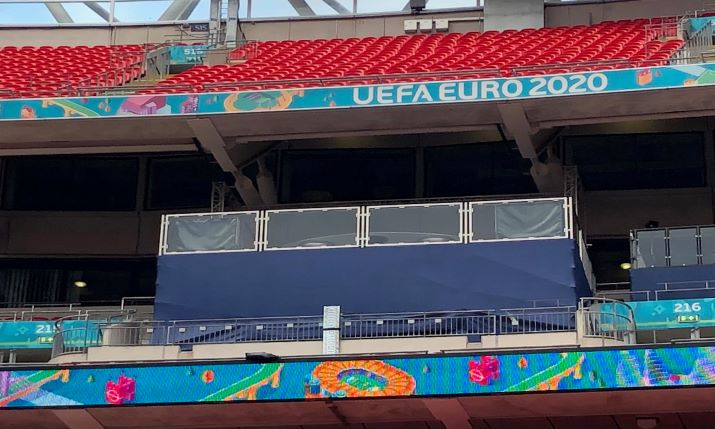
Euro 2020 is the launch event for the new look for all BBC Sport football going forward
Launching new BBC Sport football image
BBC Sport is changing the look of all its football programmes, with Euro 2020 being the launchpad to showcase those changes. Bigwood explains: “We’ve built a 360 degree virtual reality (VR) studio. We’ve got a new set and a whole new set up. So whether we’re on the road or whether we’re in Salford, the aspiration is that everything will have a similar look and feel and branding. The Euro’s is actually the launch event for the new look for all BBC football. We will carry that on into next season with all our domestic programming.”
He goes on: “With dock10, we’re bringing in a whole new VR set. It’s something we’ve been working on for quite a few months. When the original plans were submitted the intention was that [BBC Sport would use] HQ7 [one of the studios at dock10’s facilities in Salford] for fewer matches and fewer of the higher profile matches. Now though, we’ve got a whole new design. We’re using some of the UEFA feeds to help us create the landscape within the studio.
“We built the new studio with all the social distancing guidelines [in mind]. The hard elements of the studio have been designed for us by a guy we’ve used many times called Ian Webber, based in Hamburg. Ian also has responsibility to oversee all of the various outside broadcast sets as well as the set in Salford. We’ve also been working with AE Live and dock10 to actually design and build the virtual reality elements that then go around Ian’s design.”
Building the new studio has not been simple thanks to the pandemic and Brexit, states Bigwood. He comments: “Because of COVID and Brexit [we’ve had] challenges we never thought we’d face, like trying to source the raw materials within lockdown, whether it be Perspex or whether it be paint; that was difficult. And then we had to transport everything to the UK and obviously another dimension [to these challenges] is that because of Brexit and not being in the EU, we had those [delivery and transportation] challenges to overcome as well. But I’m pleased to say it’s all now built and I’m looking ready to go in there at Salford.”
Bigwood concludes: “We’re doing a lot very differently. We’re configuring the gallery for example, so we can do UHD, and a lot more. We’ll get there!”
Watch all the action on Friday 11 June for Turkey v Italy in Rome, followed by Wales v Switzerland on 12 June, England v Croatia on 13 June and Scotland v Czech Republic and Spain v Sweden on 14 June live across BBC One, BBC Two, BBC iPlayer and the BBC Sport website and app

